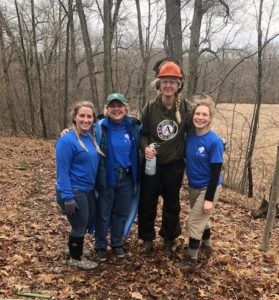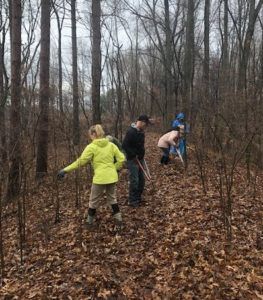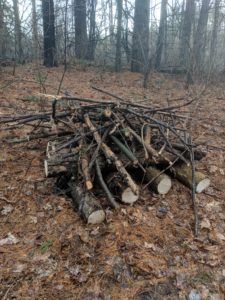Consumers Energy Teams up with OTG at Dansville State Game Area
OTG has partnered with Consumers Energy in the past, and we are excited to have them joining us for two more OTG projects this fiscal year. Consumers Energy values their community by offering a chance for their employees to give back, and in this case, give back to public land and enhance wildlife habitat in the process. The first project took place this past Friday at Dansville State Game Area. The second project is set to kick off this Friday at Barry State Game Area from 9am- 2pm.
two more OTG projects this fiscal year. Consumers Energy values their community by offering a chance for their employees to give back, and in this case, give back to public land and enhance wildlife habitat in the process. The first project took place this past Friday at Dansville State Game Area. The second project is set to kick off this Friday at Barry State Game Area from 9am- 2pm.
Prior to the project at Dansville Shaun and I, along with Wildlife Technician Chad Krumnauer, set aside some time to walk the project area. The purpose of this was to check for flooded areas and perform any necessary prep work to the site. In fact, we had to change the site of the project due to flooding. Chad was able to pick out a new trail for the project that was in need of some maintenance.
 Thirteen Consumers Energy employees braved the morning rain to participate in the OTG project. Joe, another Wildlife Technician of the Dansville State Game Area, also joined Shaun, Chad, and me, to get things rolling Friday Morning. We all gathered together to go over safety and share a little bit about why we are able to manage public land and how OTG makes an impact. From there, we explained the project; clear away woody brush, fallen trees, invasive plant species, away from an access hiking trail and use the branches and logs to make rabbit and small animal habitat.
Thirteen Consumers Energy employees braved the morning rain to participate in the OTG project. Joe, another Wildlife Technician of the Dansville State Game Area, also joined Shaun, Chad, and me, to get things rolling Friday Morning. We all gathered together to go over safety and share a little bit about why we are able to manage public land and how OTG makes an impact. From there, we explained the project; clear away woody brush, fallen trees, invasive plant species, away from an access hiking trail and use the branches and logs to make rabbit and small animal habitat.
The trail within the State Game Area was shaped like a horseshoe, so we divided into two ground and started on opposite ends of the trailhead. Each group worked for about two hours, clearing the trail and building habitat. We even made a friendly competition as to who can reach the flag in the middle of the trail first. Shaun’s group made it there first, but that is because my group was working smarter not harder (all fun and games). Every volunteer was able to get their hands dirty, several members in my group were commenting on how much fun they were having just by being outside and contributing.
started on opposite ends of the trailhead. Each group worked for about two hours, clearing the trail and building habitat. We even made a friendly competition as to who can reach the flag in the middle of the trail first. Shaun’s group made it there first, but that is because my group was working smarter not harder (all fun and games). Every volunteer was able to get their hands dirty, several members in my group were commenting on how much fun they were having just by being outside and contributing.
Around 12:30pm we gathered up back at the DNR barn and conversed over pizza. During this time, the volunteers were actively asking questions and sharing their experience. The project was a success, eight rabbit habitat piles were built and the trail was cleared from start to finish. All the volunteers left with a smile on their face and a promise to return and use the trail one day.
The post Consumers Energy Teams up with OTG at Dansville State Game Area appeared first on Michigan United Conservation Clubs.
Recent Posts



